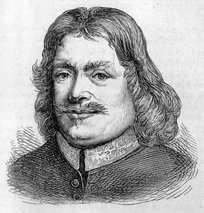There’s no Blue Ox in John Bunyan’s The Pilgrim’s Progress (1678), though there does seem to be about everything else.
The book is an English Christian classic for its allegorical portrayal of a pilgrim’s pilgrimage. In Bunyan’s tale, “Christian” is both a metaphor (one who accepts Jesus as Christ) and the name of the Pilgrim who takes a life changing journey from the City of Destruction to Mount Zion and the Celestial City. Christian’s trip reads like Alice in Wonderland dosed with Voltaire’s Candide and highway-tested with Zarathustra-like problem solving. For example, after seeing the cross, dropping his burden and watching it fall into the mouth of a sepulchre (burial pit), Christian meets three Shining Ones (angels) who bless him with gifts; he then breaks into song:
Who’s this? the Pilgrim. How! ‘tis very true,
Old things are passed away, all’s become new.
Strange! He’s another man, upon my word.
They be fine feathers that make a fine bird.
Then Christian gave three leaps for joy, and went on, singing:
Thus far did I come laden with my sin;
Nor could aught ease the grief that I was in
Till I came hither: What a place is this!
Must here be the beginning of my bliss?
Must here the burden fall from off my back?
Must here the strings that bound it to me crack?
Blest cross! blest sepulchre! blest rather be
The Man that there was put to shame for me![i]
John Bunyan (1628-1688) was a “tinker” by trade (he fixed pots and pans and traveled Gypsy-like) and an earthy-type of preacher (imagine a swearing Puritan). He was jailed twelve years for preaching Protestantism (basically, he wanted to preach his way – the way he felt the Good Lord); they would have let him out if only he’d stop the preaching – but he kept saying he’d preach his word of God as soon as he was out the prison gates. Bunyan began The Pilgrim’s Progress while jailed (he wrote lots of books) and the Quakers helped secure his unconditional release through petition to the English Crown.
How famous was John Bunyan? Ben Franklin wrote in his Autobiography (1791) that The Pilgrim’s Progress was the second most popular book in colonial America (Bible first); he also said, as a noted book collector, that Bunyan’s works were his first complete collection.
Obviously, Bunyan and the Protestants didn’t invent the Pilgrim: there have been and will be Jewish pilgrims, Catholic pilgrims and even Nothing-in-Particular pilgrims. In the US though, our founding and what we celebrate on Thanksgiving Day are rooted in a Protestant-Puritan Pilgrim Age.
This problem, that there are no Protestants on the US Supreme Court (the last one was in 2010, Justice John Paul Stevens), is not a religious problem; Article VI of the US Constitution is clear on that question, as it states: “but no religious Test shall ever be required as a Qualification to any Office or public Trust under the United States.” No, this is about representation and twelve words in Article I of the US Constitution: “The Number of Representatives shall not exceed one for every thirty Thousand.” Unambiguously, this is not religious: it’s representational and about representing We the People in Congress according to our birthright – George Washington’s number, 30,000.
The US Congress sets the number of justices on the Court and a constitutional House of 10,000 Representatives would certainly add judges; to wit, as things are, five judges decide the fate of a law for a nation of over 300 million citizens: that’s one justice for every 60 million people.
Here’s a just bid: add a nine before the nine to make it 99.
Yeah, 99 Supremes instead of nine. That alone would add Protestants (51% of Americans according to Pew Research), Nothing-in-Particulars (12%), Mormons (1.7%), Atheists (1.6%), Buddhists (0.7%), and Muslims (0.6%) to the six Catholics (24%) and three Jewish (1.7%) justices on the Court. While we are on the topic, let’s think of adding citizens like a truck driver judge (approximately 0.5%), you know, people familiar with life on the road, journeying like a pilgrim across this land of ours – yeah that sounds supreme as well.
In The Pilgrim’s Progress, after encountering the Shining Ones, Christian’s dreamscape takes him to three men in iron fetters – Simple, Sloth and Presumption – reminding all of us in the 21st century (and perhaps even this weekend) that maybe things haven’t changed that much.
Happy Thanksgiving Everyone ~ Peace Up!
Bryan W. Brickner
[i] John Bunyan, The Pilgrim’s Progress (New York: Washington Square Press [1678] 1961), 37.

 RSS Feed
RSS Feed
